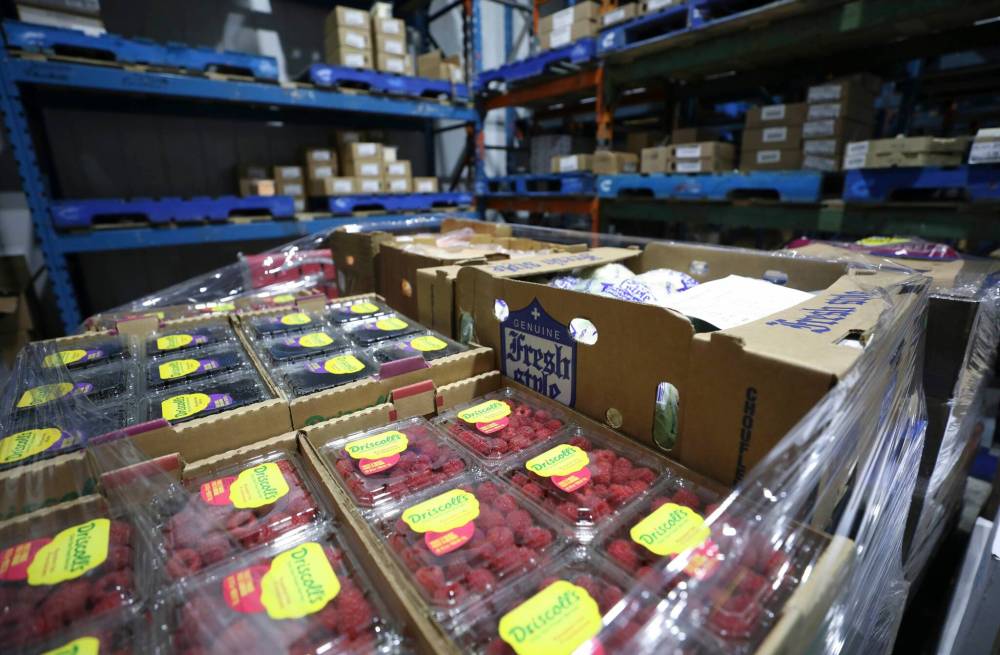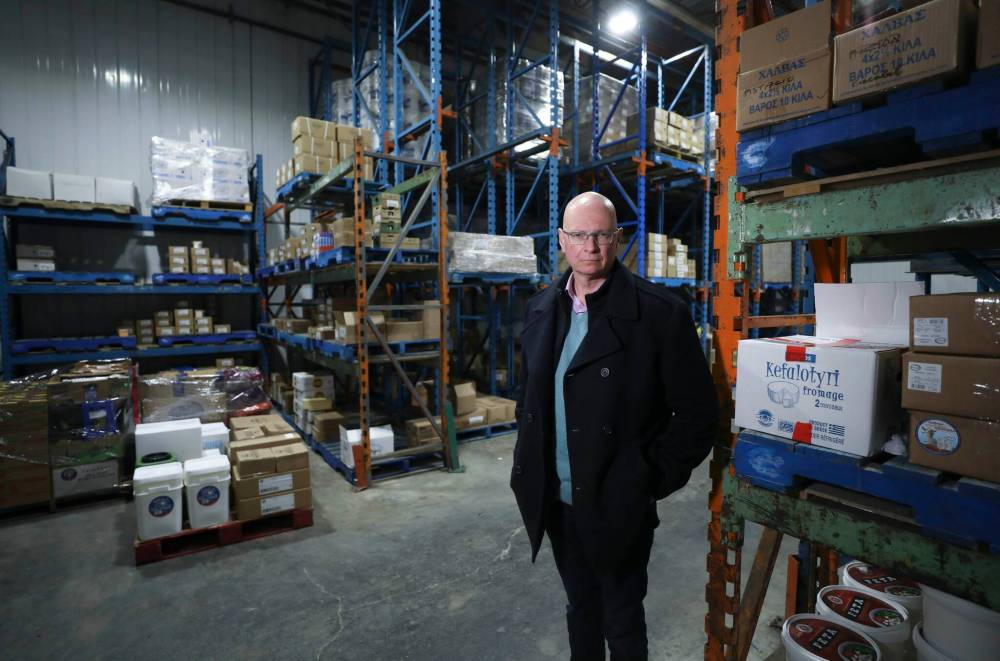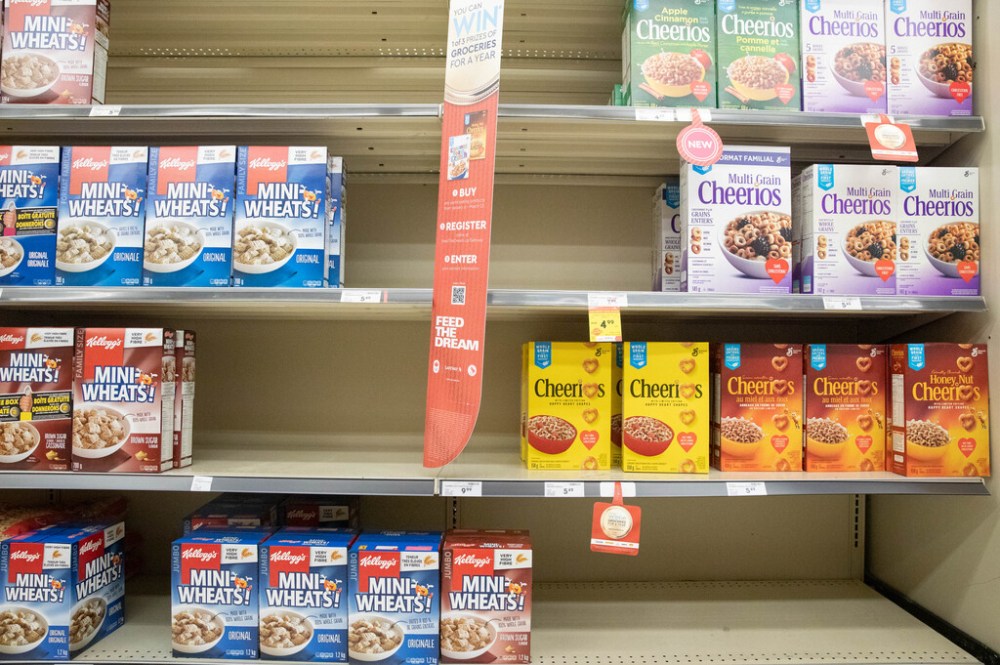Attention shoppers: don’t panic! Despite some bare shelves at grocery stores, there are no shortages, yet
Read this article for free:
or
Already have an account? Log in here »
To continue reading, please subscribe:
Monthly Digital Subscription
$0 for the first 4 weeks*
- Enjoy unlimited reading on winnipegfreepress.com
- Read the E-Edition, our digital replica newspaper
- Access News Break, our award-winning app
- Play interactive puzzles
*No charge for 4 weeks then price increases to the regular rate of $19.00 plus GST every four weeks. Offer available to new and qualified returning subscribers only. Cancel any time.
Monthly Digital Subscription
$4.75/week*
- Enjoy unlimited reading on winnipegfreepress.com
- Read the E-Edition, our digital replica newspaper
- Access News Break, our award-winning app
- Play interactive puzzles
*Billed as $19 plus GST every four weeks. Cancel any time.
To continue reading, please subscribe:
Add Free Press access to your Brandon Sun subscription for only an additional
$1 for the first 4 weeks*
*Your next subscription payment will increase by $1.00 and you will be charged $16.99 plus GST for four weeks. After four weeks, your payment will increase to $23.99 plus GST every four weeks.
Read unlimited articles for free today:
or
Already have an account? Log in here »
Hey there, time traveller!
This article was published 28/01/2022 (1411 days ago), so information in it may no longer be current.
You may have noticed emptier grocery shelves.
Produce might be closer to its expiry date than normal; certain brands may be unattainable or in short supply.
However, Winnipeggers are not in panic-buying mode.
“We’re not ordering that much more than we normally do,” said Food Fare owner Munther Zeid. “Everything’s normal.”
Sylvain Charlebois, a Dalhousie University professor of food distribution and policy, disputed a National Post article that quoted him saying Winnipeg is experiencing panic buying.
“For Winnipeg itself, I couldn’t find any strong evidence it was happening,” Charlebois said, noting he emailed the reporter before the article’s publication on Thursday.
Still, many grocers are trying to fill gaps in their aisles.
Politicians from Alberta Premier Jason Kenney to federal MP Melissa Lantsman have pointed to such shortages as a reason to end Ottawa’s new vaccination policy for truckers, which took effect last Saturday.
Halfway around the world to source products
wfpsummary:John Atama left for Nigeria Thursday to source hard-to-find goods for his Fort Garry grocery store.
He’ll be in the African country for three months, sorting items for My Spice House and packing them into a 40 ft. container to be shipped to Canada.
“It’s cheaper that way for us,” Atama said in his Pembina Highway shop hours before the trip. “Prices are going up, salaries are not.”:wfpsummary
John Atama left for Nigeria Thursday to source hard-to-find goods for his Fort Garry grocery store.
He’ll be in the African country for three months, sorting items for My Spice House and packing them into a 40 ft. container to be shipped to Canada.
“It’s cheaper that way for us,” Atama said in his Pembina Highway shop hours before the trip. “Prices are going up, salaries are not.”
The ethnic grocery store’s products mainly come from India, Africa and the United States. Atama has watched prices soar. Everything from raw materials to the cost of fuel — and subsequently, the cost of transport — has jumped.
“We’re just trying to survive and stay in business,” Atama said. “It’s really hard, but it is what it is.”
Customers are unhappy about increased grocery bills, but the Nigerian-Canadian said he can’t help the trickle-down effect.
“I say, ‘Look, I can show you my invoices. It’s not about me.’”
My Spice House has already lost patrons due to a lack of supply. Items that used to arrive in three days now take several weeks, Atama said. Sometimes, shelves are empty.
“People get so frustrated when they come one, two, three times and ask for the same product, and we can’t supply (it),” Atama said. “It’s really frustrating because you’re wasting your gas to come down here.”
He encourages customers, many of whom are Indian or Nigerian, to call ahead to ensure if something specific is in stock.
The products with shorter expiry dates are the trickiest, Atama said. Basmati rice from India is often scarce.
But, the entrepreneur has loaded up on goods with long shelf lives, including the “basic necessities for families” like certain beans and lentils.
The lengthy wait for goods isn’t new, Atama said. He believes it began getting worse after Ottawa announced in November it has plans to change vaccine rules for truckers.
Fresh meat products were almost gone Thursday in 88 Mart, a Korean market off Pembina Highway.
“(There’s) too many different products… frozen, fresh, dried… (that) are delayed,” said co-owner Leon Park.
Ninety per cent of the store’s offerings come from South Korea, Park said. Shipments come through Toronto or Vancouver, but the backlogs have been unrelenting.
Smaller grocers have been closing during the pandemic. In the West End alone, Crown Grocery, Kim’s Mini Market and LinLan Grocery have shuttered. The latter, a Vietnamese grocery, closed in November, but its sister company, a restaurant called Banh Mi Mr. Lee, opened in December.
-— Gabrielle Piché
However, the situation is far more multi-faceted than a truck driver shortage, and it won’t be resolved right away, according to those in the industry.
“I’ve seen empty shelves for months. We’re just talking about it now because it’s politicized,” Charlebois said.
People can blame the shortages on the global pandemic, which is entering its third year. But, the pandemic is an umbrella sheltering many variables.
“Consumers shouldn’t be walking into a grocery store expecting perfection right now,” Charlebois said.
Tom De Nardi has watched stock fluctuate at family-run Piazza De Nardi, which houses a grocery centre and wine shop. The group also runs Mondo Foods, a wholesale distributor that ships across Canada.

“Anything that’s… flowing across the border, either by import container or a truck… is certainly subject to challenges,” De Nardi said.
Mondo Foods circulates a New Zealand grass-fed butter. Currently, it’s waiting an extra three months for the spreads.
“It’s not the problem of getting the butter,” De Nardi said. “The people producing the labels in Quebec do not have the staff to run the machines.”
Worker shortages due to illness, or a general lack of staff, can happen at any time during the manufacturing process. Severe weather events, including flooding in British Columbia, have also backlogged goods’ production, causing companies to play catch-up. Labour disputes, like the U.S. Kellogg’s strike that ended last month, also contribute to supply chain slowdowns.
Once a product is ready to go, it needs to be transported.
“Finding a shipping container is difficult,” De Nardi said, noting it’s been hard getting imported dairy products from Italy and fresh produce from the United States.
Again, worker shortages are a factor — this time, including truck drivers. Some fear Ottawa’s new mandate will cause current workers to leave their jobs. Unvaccinated truckers entering the country from the United States face a two-week quarantine.
A semi-truck convoy protesting the new rules crossed Winnipeg Monday on its way to Ottawa. Neither the Canadian nor American trucking associations responded to Free Press queries about vaccination levels by print deadline.
“It looks like a lot of trucks, but in the grand scheme of things, it isn’t,” said Barry Prentice, a University of Manitoba supply chain management professor.
It will still be hard to pick up the slack, regardless of how many people leave, he said.
“We already have a shortage and very high prices for freight,” Prentice said. “If the truckers aren’t there to move (goods), then those things won’t be there.”

People may see fewer fresh fruits and vegetables from the United States in the coming weeks, if the mandate has any effect on the trucking industry, Prentice said.
The change comes during winter, when transporters tackle winter storms and unpredictable conditions.
Challenges don’t end when goods reach the grocery store, De Nardi said. Some markets are short-staffed due to sickness or unfillable job openings.
Last week, about 10 of over 60 staff at Piazza De Nardi were ill at home. Workers do their best, but less hands means products hit shelves at a slower pace, De Nardi said.
“Our business doesn’t grow by having empty shelves,” said Scott Clement, owner of Dakota Family Foods. “(And) we don’t want to let (customers) down.”
He’s experienced shortages from fresh produce to cereals and soups.
“There’s no rhyme or reason as to what items we’re getting shorted on,” he said, adding things change weekly.
The independent business has purchased goods from smaller wholesalers, in addition to their main source, in an attempt to fill gaps.
A product might not be in stock one day but readily available the next.
Snap, Crackle, Pop: Some cereals are hard to find

Posted:
Breakfast bowls across the country remain bare as a mini-cereal crisis continues to confound Canadians.
“There’s no reason to bulk buy or to load up on any specific items,” Clement said. “It’s just going to be a matter of time when it all starts coming through again.”
Some companies have begun using “empty shelf camouflage” to prevent people from hoarding, Charlebois said. Instead of leaving gaps on shelves, businesses put a single row of product to look more stocked than they are.
Bulk buying will worsen supply chain issues, as evidenced by the toilet paper and disinfectant shortages of COVID-19’s first wave, Charlebois said.
Grocery store owners avoid over-purchasing, because it leads to wasted products and money, according to Rick Reid, the executive director of the Manitoba Institute of Supply Chain Canada.
“Consumer demand is really volatile at the moment,” Reid said, referencing 2020’s toilet paper supply.
It makes it hard to predict how many items grocery stores should buy, he said.
Reid said supply chains will catch up, but it depends on consumer demand. Charlebois predicts it will take months for the supply chain to stabilize. De Nardi thinks it will normalize as the pandemic wanes.
gabrielle.piche@winnipegfreepress.com

Gabby is a big fan of people, writing and learning. She graduated from Red River College’s Creative Communications program in the spring of 2020.
Our newsroom depends on a growing audience of readers to power our journalism. If you are not a paid reader, please consider becoming a subscriber.
Our newsroom depends on its audience of readers to power our journalism. Thank you for your support.





